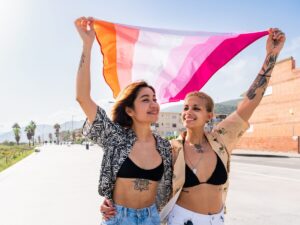For every 10 women vaccinated against Covid-19 around the world, there are 9 men. The COVID-19 Sex-Disaggregated Data Tracker shows that gender gaps have been overcome when we consider immunisation to beat the coronavirus pandemic.
According to Our World in Data, a project of the University of Oxford, 28.2% of the world population has received at least one dose of a COVID-19 vaccine, and 14.5% was fully vaccinated by the end of July 2021.
In the United Kingdom, to the same date, 68.9% of the total population has received at least one vaccine dose, and 55.9% of the population has received all doses prescribed by its vaccination protocol. About 52% of people vaccinated in the country are women.
In Uruguay, the second country in the Our World in Data’s ranking of share of people vaccinated– it is only behind the United Arab Emirates (79%) –, 73% of the population has taken at least one dose. Last March, the Ministry of Public Health reported that 59% of the total vaccinated population at that time were women – 51.5% of Uruguayans are females.
“If there is a trend here, it is that the work of care assigned to women might make them particularly more receptive to vaccination, and I would expect women to be more prone to getting a vaccine and want their families vaccinated”, analyses Dr Luísa Calvete Portela Barbosa, Lecturer of International Relations at Cardiff University, who is also a researcher from feminist theoretical approaches.

Thuanny Machado, 37, a civil servant from Campinas, Brazil, believes that “vaccination is the only way out of this pandemic, and crucial to overcome this sad moment.” Six months pregnant, she got her first dose in June 2021 because “the vaccine is the protection of the pregnant woman and her baby since the consequences of Covid-19 are very dangerous for both and can lead to death”.
“I understand that the vaccine can prevent severe symptoms of Covid-19 leading to hospital admission and many consequential effects”, says Nidia Dias, 36, a hairdresser from Lisbon, Portugal. She got her first dose recently. “I think about my future and my children’s futures, and I want them to get it because the vaccine makes me feel more protected and will protect my loved ones as well”, the mother of four – two girls, 7 and 9, and two boys, 3 and 8 – Nidia says.
Both Nidia and Thuanny do not address any impact on their personal and professional routines after getting the vaccine.
“The vaccine adds a feeling of safety to go to work or care for others”, states Dr Barbosa, “but the expansion of the carer role through the feeling that she is safe might be something to look at.”
Dr Barbosa also highlights the need for more information about how transwomen are being treated when they are getting the vaccines: “I expect any encounter with the state to be a violent experience for them”, she warns.
Economic Inequality Challenges
In the face of some of the world’s positive vaccination data, others are running behind. India is the main concern case. According to its national statistics site, CoWin, 240 million men have received at least one dose of the vaccine, while 210 million women have by the end of July 2021. It means that 46.5% of the vaccinated population in the country are female, against 48.7% of the Indian population being female in 2020.
Beyond India, The COVID-19 Sex-Disaggregated Data Tracker reports negative data on women vaccination in a few other countries: Gabon (20% of the vaccinated population are women), Somalia (30%), Timor-Leste (33.8%), Bangladesh (37.2%), Gambia (44.5%), Equatorial Guinea (45%), Bermuda (47.9%), Cambodia (49%), and Jersey (49.1%).
Furthermore, inequality is heavily impacting poorer countries: only 1.1% of people in low-income countries have received at least one dose to date, according to Our World in Data.
A World Bank study released this month reported that this year “growth in advanced economies is expected to reach 5.4% per cent—the highest rate in nearly 50 years—powered by rapid vaccination and unprecedented fiscal and monetary-policy support since the beginning of the pandemic”. However, Covid-19 is causing massive harm to the people that can least afford comprehensive public policies.
“Maternal and child mortality are on the upswing in IDA countries because of reduced access to health services and food”, alerts the World Bank. The organisation has elected 74 countries to borrow from the International Development Association (IDA) – in half of those countries, people live on less than $1.90 a day.

“This will be a critical period for extinguishing COVID-19 and for putting the poorest economies on the right track to overcome deep challenges of development confronting them in the long term”, the study states. It prescribes speeding up the delivery of vaccines as the first step toward overcoming these challenges.
Dr Barbosa estimates that people from low-income countries are very receptive to vaccines since they experienced life without them until recently or continue to do so. “People want access to the best they can get, and they know when they are not getting it”, she says.
Regardless of countries’ economic development level, “we must remember that economic crises lead to greater precarisation of work across genders”, says Dr Barbosa. The so-called informal jobs tend to concentrate in the care and services industry and are still predominantly taken by women. Those are also low-income and highly exposed to the virus jobs that “could not stop”, she reminds us. These workers tend to live in smaller houses, often with more people, rely on public transportation, and are more likely to not be believed when they ask for help. The race is another social issue of impact on them.
The researcher also emphasises the work of caring assigned to women as essential but unpaid or poorly paid. “For example, women in rural areas and smaller cities that support male migrants will be, initially, less exposed to the virus, but will very likely be the last in line to receive the vaccine, unless the country has a good outreach to these areas”, says Dr Barbosa.
Migrants are especially vulnerable since they have precarious jobs, and it is not restricted to richer countries. From Dr Barbosa’s point of view, “health care systems should openly take care of those that might be considered illegal”.

Vaccine Refusal
Despite all that, there is a trend of increasing vaccine scepticism. Reuters polling found in research conducted from March to May 2021 in the United States that 26% of the respondents were not very interested or not at all interested in getting a Covid-19 vaccine. Polls account that vaccine refusal is significantly higher among supporters of the American Republican Party. In the last week of July 2021, the Democratic Party Mayor of New York, Bill de Blasio, announced that the city would give $100 to those who receive their first doses at city-run vaccination sites as an incentive.
“This trend emerged in the rich countries as a political tool – isn’t it always? – attached to the far-right”, Dr Barbosa proposes. Mistrust in CoronaVac effectivity and AstraZeneca risk of blood clots are examples.
Brazilian fuss on vaccines and vaccination upsets Thuanny. “The Brazilian federal government has done a disservice to the population by questioning the vaccine and harming vaccination”, denounces. Brazil’s President, Jair Bolsonaro, is a far-right politician.
“I trust science, scientists and scientific institutions, but I ended up considering why the government might be against the vaccine”, admits. From her point of view, Brazilian media encourages vaccination but does not provide sufficient technical information. In addition, she mentions that reports of deaths supposedly caused by the vaccines, including among pregnant women, are very inaccurate.
“Government and media end up issuing contradictory information, and this generates insecurity”, she complains. “The decision to take the vaccine was not only about my body, but also about my baby, and it ended up being more complex”, she says.
Thuanny tells she did her research, looking for information from sources with a strong scientific background and different countries. “I recommend that women and girls seek quality information from various reliable sources to make the decision that will make them safer, always questioning”, says.
Dr Barbosa sees Covid-19 vaccination as an opportunity for political protest and for signalling empathy. “People are walking around wearing t-shirts that have their lost ones’ faces printed in them”, she mentions. “If we take that empathetic approach to economics, I think we can gather support for the left and progressive voices and demand a real change to what was an unjust and dangerous ‘normal’,” she concludes.
“The pandemic also exposed that having women in high positions does not necessarily mean change,” Dr Barbosa points out. “Merkel’s Germany blocked the approval of the Covid-19 vaccine patent, but the vaccine apartheid we see today needed not to exist”.
















